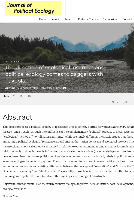
Journal of Political Ecology
Scope & Guideline
Transforming Environmental Discourse Through Political Insight
Introduction
Aims and Scopes
- Political Ecology Frameworks:
The journal employs political ecology as a central framework, analyzing the interplay between ecological systems and human socio-political structures, particularly in the context of environmental justice and governance. - Decolonization and Indigenous Knowledge:
A consistent focus on decolonizing environmental practices and integrating Indigenous knowledge systems, highlighting the importance of local and marginalized voices in ecological discourses. - Extractivism and Resource Management:
A core area of research involves the examination of extractivist practices (e.g., mining, agriculture, forestry) and their socio-environmental impacts, particularly in developing regions. - Gender and Environmental Conflict:
The journal addresses gender dynamics in environmental conflicts, exploring how gender roles affect and are affected by ecological governance and resource management. - Climate Change and Adaptation Strategies:
Research on climate change, its impacts, and adaptive strategies is prevalent, with a focus on how political and economic structures influence resilience and vulnerability. - Urban Political Ecology:
An emerging area of interest, the journal explores urban environments and the socio-ecological challenges they face, including issues of sustainability, governance, and public health.
Trending and Emerging
- Climate Colonialism:
A growing body of work examines the concept of climate colonialism, exploring how climate change initiatives can perpetuate colonial legacies and affect marginalized communities, highlighting the need for just and equitable climate action. - Green Extractivism:
Research on green extractivism is trending, looking at how ostensibly sustainable practices can lead to environmental degradation and social injustices, challenging the narrative of 'green' development. - Intersections of Gender and Ecology:
There is an increasing focus on the intersections of gender and environmental issues, exploring how gender dynamics shape environmental governance and conflict, particularly in resource management. - Indigenous Resistance and Knowledge Systems:
Emerging themes emphasize Indigenous resistance to extractivism and the importance of Indigenous knowledge systems in ecological management, promoting decolonial approaches to environmental governance. - Urban Resilience and Political Ecology:
An upward trend in research addressing urban resilience highlights the political ecological dimensions of urban environments, focusing on sustainability, social justice, and the impacts of climate change in urban contexts. - Toxicity and Environmental Justice:
Recent publications increasingly explore the politics of toxicity and its implications for environmental justice, examining how marginalized communities are disproportionately affected by environmental hazards.
Declining or Waning
- Traditional Conservation Approaches:
There appears to be a waning interest in traditional conservation methodologies that do not incorporate social justice or local community engagement, as newer submissions emphasize more inclusive and participatory frameworks. - Purely Economic Analyses of Environmental Issues:
Research focusing solely on economic impacts of environmental policies without considering social dimensions and power relations is becoming less frequent, reflecting a shift towards more holistic analyses. - Static Views of Environmental Governance:
Papers that present static or unchanging views of environmental governance are declining, with a growing emphasis on dynamic and relational approaches that account for changing political and ecological contexts. - Overemphasis on Quantitative Data:
There is a noticeable decrease in studies relying heavily on quantitative data without qualitative insights, as the journal increasingly values mixed-method approaches that capture complex socio-environmental realities. - Single-Sector Focus:
Research that examines environmental issues from a single-sector perspective (e.g., solely focusing on agriculture or forestry) is less common, as interdisciplinary approaches become more favored.
Similar Journals

Anthropology Southern Africa
Fostering interdisciplinary dialogue in the heart of Southern Africa.Anthropology Southern Africa is a prestigious journal published by Routledge Journals, Taylor & Francis Ltd, and is dedicated to advancing the field of anthropology through rigorous scholarship and critical discourse. Established in 2013 and converging through 2024, this journal sets a high standard in its category, currently holding a Q2 classification in Anthropology and a Q1 ranking in Cultural Studies for the year 2023, ensuring its position as a significant contributor to social science research. With a robust Scopus ranking that places it in the 82nd percentile for Cultural Studies and the 67th percentile for Anthropology, Anthropology Southern Africa serves as an essential platform for researchers, professionals, and students engaged in anthropological inquiry and cultural analysis. Although it is not openly accessible, the publication prides itself on high-quality submissions that explore diverse cultural phenomena and anthropological perspectives, thereby inviting interdisciplinary engagement and fostering a global academic dialogue.
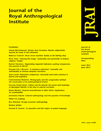
JOURNAL OF THE ROYAL ANTHROPOLOGICAL INSTITUTE
Championing Rigorous Inquiry in AnthropologyJOURNAL OF THE ROYAL ANTHROPOLOGICAL INSTITUTE, published by Wiley, stands as a prestigious platform for scholarly discourse in the field of anthropology. With an ISSN of 1359-0987 and an E-ISSN of 1467-9655, this journal has been a vital resource for researchers, professionals, and students since its inception, featuring contributions that push the boundaries of understanding in both cultural and social anthropology. The journal’s rigorous peer-review process affirms its high academic standards, reflected in its top-tier Q1 rankings in both the Anthropology and Arts and Humanities categories for 2023. With a current ranking of #78 out of 502 in Social Sciences Anthropology and #138 out of 552 in Miscellaneous Arts and Humanities, it inhabits a critical space within academia, addressing seminal issues and innovative research. While the journal is not open access, it remains accessible to those affiliated with institutions that provide subscriptions, ensuring that groundbreaking anthropological insights are disseminated widely within the academic community. As it converges from 1995 to the present, the JOURNAL OF THE ROYAL ANTHROPOLOGICAL INSTITUTE continues to shape the landscape of anthropological research, engaging a diverse readership eager to explore the intricate tapestry of human cultures.
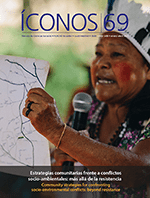
Iconos
Advancing Critical Research in Anthropology and Gender StudiesIconos is a distinguished academic journal published by FAC LATINOAMERICANA CIENCIAS SOCIALES-FLACSO in Ecuador, with an ISSN of 1390-1249 and an E-ISSN of 1390-8065. Since its inception in 1997, Iconos has proudly maintained an open-access policy, promoting accessibility and dissemination of critical research across various disciplines. With a strong focus on Anthropology, Gender Studies, and Social Sciences, this journal has achieved a commendable standing, being categorized in the Q2 quartile in 2023 across multiple categories in these fields. Notably, it ranks #199 in Anthropology and #91 in Gender Studies, placing it in the upper percentiles of academic publishing. The journal aims to foster interdisciplinary dialogue and to illuminate socio-cultural dynamics through rigorous scholarship. With its commitment to quality, research diversity, and social relevance, Iconos serves as an essential resource for researchers, professionals, and students alike, seeking to engage with contemporary social issues from a Latin American perspective.
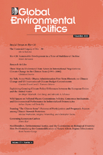
Global Environmental Politics
Navigating the Intersection of Environment and Politics.Global Environmental Politics, published by MIT Press, serves as a pivotal platform for interdisciplinary research that intersects the fields of environmental science, political science, and sustainability. Established with the aim to address the most pressing global environmental challenges, this journal has achieved prestigious recognition, placing in the Q1 category across multiple disciplines such as Global and Planetary Change and Political Science and International Relations as of 2023. With an impressive Scopus rank of #23 out of 706 in Political Science and International Relations, it appeals to a diverse audience by publishing high-quality, peer-reviewed articles that contribute to knowledge and policy frameworks essential for promoting sustainability and effective governance. Researchers, professionals, and students engaged in environmental studies will find this journal invaluable for exploring innovative ideas, policy analyses, and case studies designed to foster informed decision-making in an era of rapidly changing ecological and political landscapes. Access to the journal's articles is available through standard subscription options, ensuring that critical research remains accessible to the academic community.
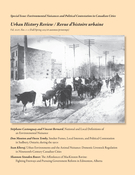
URBAN HISTORY REVIEW-REVUE D HISTOIRE URBAINE
Advancing Knowledge at the Crossroads of History and UrbanismURBAN HISTORY REVIEW - REVUE D'HISTOIRE URBAINE, published by University of Toronto Press Inc., serves as a vital scholarly resource in the intersection of history and urban studies, focusing on the evolution of urban life and spaces. Established in 1978 and publishing continuously until 2012, and then resuming in 2014, this journal reflects on urban historical perspectives and contemporary urban issues, making significant contributions to both fields. With an impressive Q2 ranking in History and a Q4 ranking in Urban Studies as of 2023, the journal is positioned to attract a diverse readership of researchers, practitioners, and students alike. While currently not an open-access journal, it maintains a reputation for rigorous scholarship, encouraging the exploration of urban narratives that shape our understanding of cities today. For those invested in the past's lessons for future urban development, this journal is indispensable in navigating the complexities of urban history.

ANTHROPOLOGICAL QUARTERLY
Shaping the Future of Anthropological DiscourseANTHROPOLOGICAL QUARTERLY, published by the George Washington University Institute of Ethnographic Research, stands as a vital resource in the field of anthropology and broader arts and humanities studies. With an ISSN of 0003-5491 and an E-ISSN of 1534-1518, this esteemed journal has been contributing to academic discourse since its establishment in 1981. The journal holds a respected position in both the Q2 category for Anthropology and the Q2 category for Arts and Humanities (miscellaneous), demonstrating its impact and relevance, as evidenced by its rank of #152 out of 502 in the Social Sciences sector for anthropology and rank of #179 out of 552 in the Arts and Humanities field. Researchers, professionals, and students can rely on ANTHROPOLOGICAL QUARTERLY for rigorous peer-reviewed articles that push the boundaries of ethnographic research and anthropological theory, addressing contemporary issues with scholarly precision. The journal’s commitment to fostering critical analysis and interdisciplinary perspectives establishes it as an essential platform for advancing knowledge within its diverse and dynamic field.

Letras Verdes
Unlocking the Power of Words to Inspire Environmental ChangeLetras Verdes, published by the FAC Latinoamericana Ciencias Sociales (FLACSO) in Ecuador, is a distinguished academic journal that focuses on environmental humanities and literature's intersection with ecological issues. With an ISSN of 1390-6631 and an E-ISSN of 1390-6631, this Open Access journal has been disseminating knowledge since 2008, encouraging wide accessibility to research findings. Although currently without an H-Index, Letras Verdes plays a vital role in promoting interdisciplinary dialogue among scholars, professionals, and students interested in sustainability, environmental ethics, and cultural studies. Its commitment to open access not only enhances visibility but also fosters a global exchange of ideas, making it an essential platform for those seeking to explore the complex narratives surrounding environmental challenges.

Environmental Humanities
Fostering Innovative Dialogues in Environmental ScholarshipEnvironmental Humanities, published by DUKE UNIVERSITY PRESS, is a premier journal that has established itself as a leading platform for interdisciplinary scholarship at the intersection of the environment and the humanities. With its open access framework since 2012, the journal fosters widespread dissemination of critical research that integrates perspectives from Anthropology, Ecology, and the Social Sciences. Currently holding impressive Q1 rankings in both Anthropology and Social Sciences for 2023, along with notable Q2 standings in Environmental Science fields, this journal provides a vital forum for innovative explorations of how human culture shapes and is shaped by environmental challenges. Situated in the United States, the journal encourages authors and thinkers to contribute to ongoing discussions about sustainability, ethics, and the cultural dimensions of environmental issues, making it an essential resource for researchers, professionals, and students alike. With a commitment to high-quality scholarship, Environmental Humanities plays a crucial role in advancing knowledge and understanding in a rapidly evolving field.

AFRICAN STUDIES
Exploring the Depths of African KnowledgeAFRICAN STUDIES, published by Routledge Journals, Taylor & Francis Ltd, is a leading academic journal that has been at the forefront of African research since its inception in 1942. With an impressive convergence of interdisciplinary insights covering Anthropology, Cultural Studies, History, and Political Science, this journal serves as an essential resource for scholars and practitioners alike. It boasts a notable impact within its field, ranking in the Q1 quartile for Cultural Studies and History and achieving a commendable Q2 for Anthropology, and Political Science and International Relations according to the 2023 category quartiles. Researchers can benefit from the journal's rigorous peer-review process, which ensures high-quality and impactful research dissemination. While it is not an open-access journal, it offers various subscription options for accessing its wealth of scholarly articles. With a commitment to advancing understanding of African contexts and perspectives, AFRICAN STUDIES plays a crucial role in shaping contemporary debates and fostering intellectual engagement within the academic community.

Journal of Integrative Environmental Sciences
Empowering research at the intersection of environment and health.Journal of Integrative Environmental Sciences, published by Taylor & Francis Ltd, stands as a pivotal platform for researchers and professionals in the fields of Environmental Science and Public Health. With an impact factor reflecting its significance in the academic community, this Open Access journal has been democratizing access to cutting-edge research since 2016, enhancing visibility and dissemination of vital insights. The journal covers a wide scope, converging studies from 2010 to 2024, and holds esteemed rankings in Q2 quartiles for Environmental Science and Public Health, indicating its substantial contribution to these critical fields. With Scopus rankings placing it favorably among its peers, researchers benefit from a diverse array of articles addressing pressing environmental and health issues, sustainability, and renewable energy. As an essential resource for advancing knowledge and fostering innovation, the Journal of Integrative Environmental Sciences encourages contributions that span interdisciplinary approaches to solving some of the most challenging environmental dilemmas of our time.